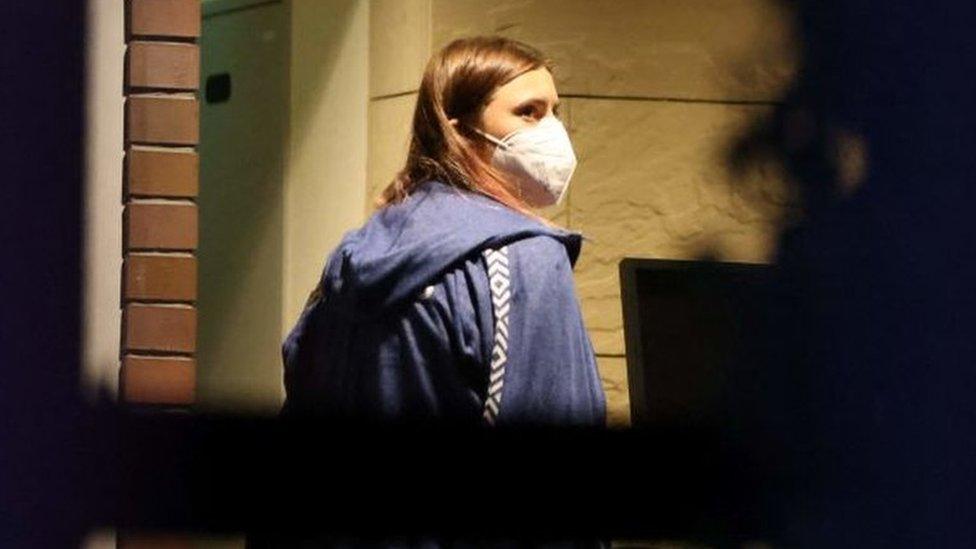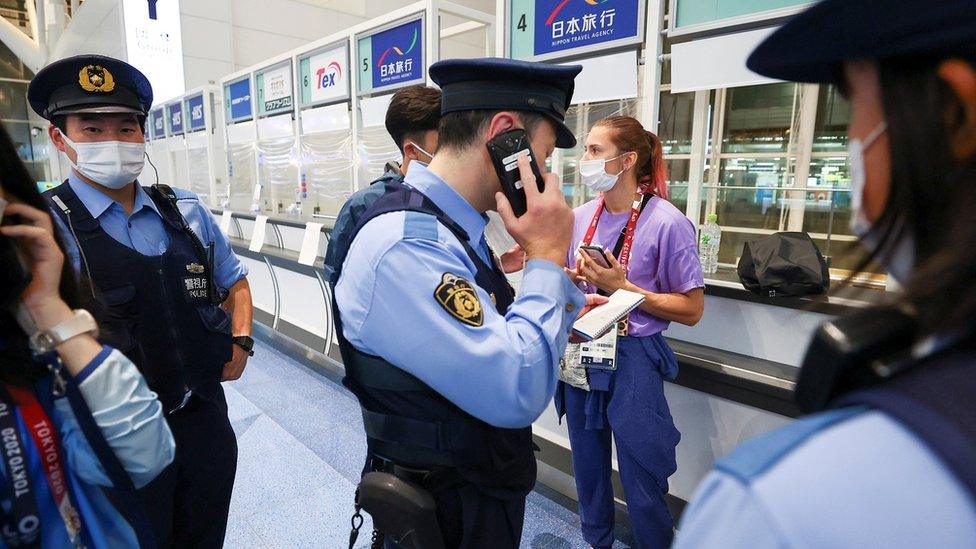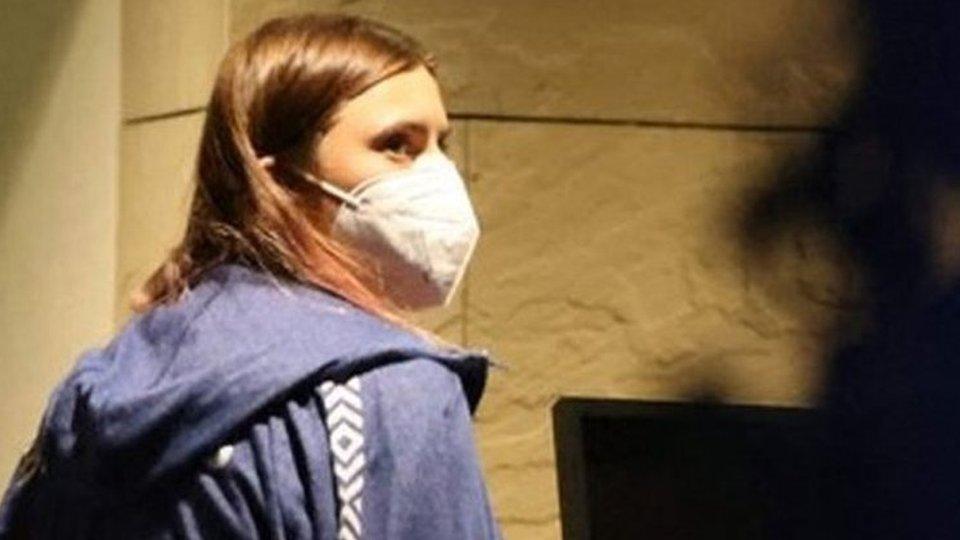Belarus sprinter Krystina Timanovskaya says protest is not political
- Published
Krystina Timanovskaya: "When it's safe, I want to return home"
A sprinter from Belarus who refused her team's order to fly home early from the Olympics says her actions were not a form of political protest.
"I love my country and I didn't betray my country," Krystina Timanovskaya, 24, told the BBC's Newshour programme.
"This is about the mistakes that have been made by our officials at the Olympics," she added.
Ms Timanovskaya has been granted a humanitarian visa by Poland and is currently at its embassy in Tokyo.
She is expected to leave Japan and travel to Warsaw on Wednesday, her supporters have said.
The athlete earlier voiced fears for her safety after she was forced to pack her belongings and driven to a Tokyo airport, after criticising her coaches.
Belarus says she was removed from the national team because of her emotional state.
But speaking to the BBC on Tuesday, Ms Timanovskaya said she did not suffer from any mental health issues and did not have any conversations with doctors at the Olympic village.
She said she was surprised when team officials told her she was leaving the Games because she "didn't say anything political", adding that she would like to return to Belarus "when I know that it's safe... maybe I'll only be able to return after five or 10 years".

The sprinter was pictured inside Poland's embassy in Tokyo
The International Olympic Committee (IOC) has launched a formal investigation into allegations that Belarus attempted to force Ms Timanovskaya to return home.
"We need to establish the full facts, that can take time," IOC spokesman Mark Adams said. "In the meantime our first concern is for the athlete."
The IOC has requested that the Belarus National Olympic Committee submit its report on the incident by the end of Tuesday.
The athlete's husband, Arseniy Zdanevich, has since fled Belarus and is currently in Ukraine. He told the BBC the couple had never been involved in politics and would return to Belarus if they did not face criminal charges.
Separately on Tuesday, the head of an organisation helping Belarusians fleeing abroad was found dead near his home in neighbouring Ukraine. Vitaly Shishov had reportedly been followed recently.
'Full solidarity'
The incident has again put the spotlight on Belarus, which has been ruled by President Alexander Lukashenko since 1994. Last year, nationwide protests over his disputed re-election were violently repressed by the security forces.
Some of those who joined the demonstrations were also national-level athletes, who were stripped of funding, cut from national teams and detained.
Poland's Deputy Foreign Minister Marcin Przydacz said Ms Timanovskaya was in direct contact with Polish diplomats in Tokyo, and that Poland would do "whatever is necessary to help her continue her sporting career".
The Belarusian government has yet to comment on the Polish decision to offer the sprinter a humanitarian visa.
The EU, meanwhile, welcomed Poland's decision. Nabila Massrali, a spokeswoman for EU foreign policy chief Josep Borrell, said the attempt by Belarus to forcibly repatriate Ms Timanovskaya was "another example of the brutality of the repression of Lukashenko's regime".
"We express our full solidarity to Krystina Timanovskaya and commend the (EU) member states that offered her support. We welcome the fact that she has now been given a humanitarian visa by Poland," Ms Massrali said in a statement to Reuters.
'Put under pressure'
The sprinter, who was due to compete in the women's 200m event on Monday, had complained on social media about being entered into the 4x400m relay race at short notice after some teammates were found to be ineligible to compete.
The video led to criticism in state media, with one television channel saying she lacked "team spirit".
Ms Timanovskaya said officials had come to her room and given her an hour to pack her bags before being escorted to Tokyo's Haneda airport. She says she was "put under pressure" by team officials to return home and asked the International Olympic Committee (IOC) for help.
"They are trying to get me out of the country without my permission," she said in a video posted on the Telegram channel of the Belarusian Sport Solidarity Foundation, which was created last year to support athletes critical of the government.
Anatol Kotau, a member of the group, told the BBC on Sunday: "She's afraid of repression on her family in Belarus - this is the main concern for her right now."

The athlete sought police protection at the airport terminal
The Belarusian Olympic committee said Ms Timanovskaya had been taken off the team because of her "emotional and psychological condition".
Team coach Yuri Moisevich said Ms Timanovskaya appeared anxious when he spoke with her on Sunday.
"I was trying to have a calm conversation with her and I succeeded," he said, adding: "Then I noticed that she would stop the conversation and start it again, then she would grab the phone and I saw that something was happening."
On Monday, IOC spokesman Mark Adams said the body had taken measures against the Belarusian committee in the run-up to the Games.
It banned some officials, including the president's son, for failing to protect athletes who had joined the demonstrations.
Heather McGill, Amnesty International's Eastern Europe and Central Asia researcher, said the country's sporting administration had been subject to "direct government control" under President Lukashenko.
"Athletes are favoured by the state and honoured by society, and it is not surprising that athletes who speak out find themselves a target for reprisals," she said.
- Published1 August 2021

- Published2 August 2021
